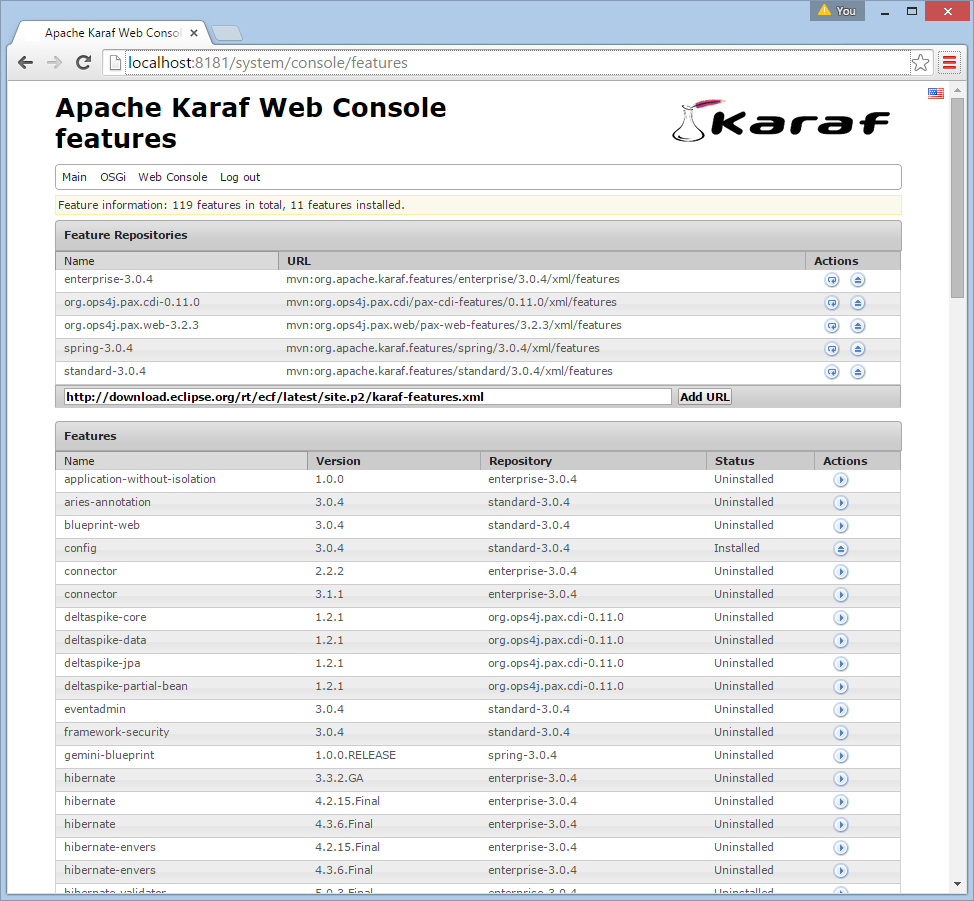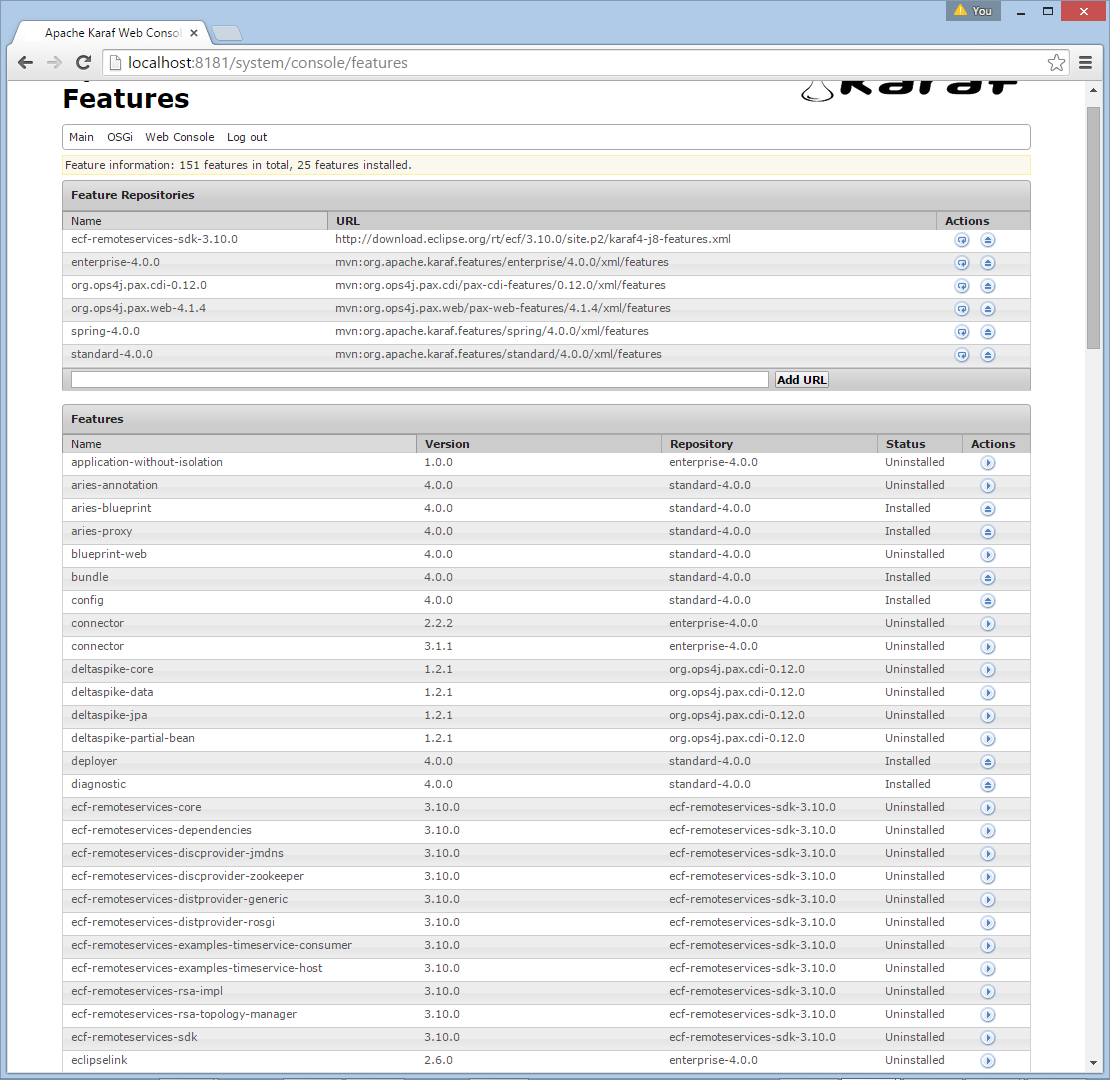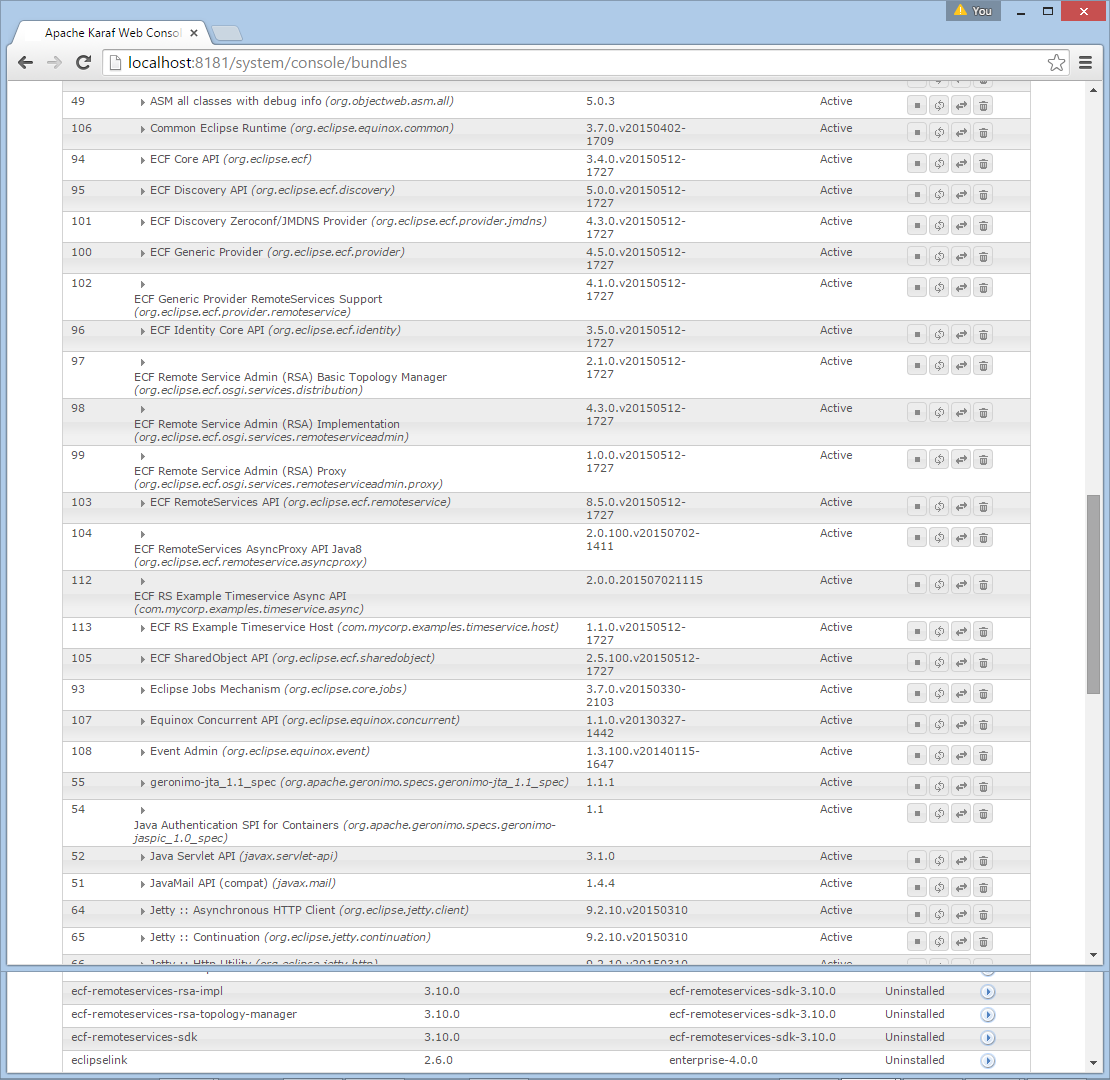Notice: this Wiki will be going read only early in 2024 and edits will no longer be possible. Please see: https://gitlab.eclipse.org/eclipsefdn/helpdesk/-/wikis/Wiki-shutdown-plan for the plan.
Difference between revisions of "EIG:Install into Apache Karaf"
| Line 1: | Line 1: | ||
| − | |||
| − | |||
| − | |||
| − | |||
==Installing ECF Remote Services SDK== | ==Installing ECF Remote Services SDK== | ||
| − | + | Requirements: ECF 3.13+ requires [http://karaf.apache.org Karaf 4 running on Java 8]. | |
| − | + | ||
| − | + | ||
| − | + | ||
| − | Requirements: | + | |
| − | + | ||
| − | + | ||
| − | + | ||
| − | + | ||
| − | + | ||
| − | + | ||
| − | + | ||
| − | + | ||
| − | + | ||
| − | + | ||
| + | Once Karaf is started, the Service Component Runtime (SCR) should be installed | ||
<pre> | <pre> | ||
| − | + | karaf@root()>feature:install scr | |
| − | + | ||
| − | + | ||
| − | + | ||
| − | + | ||
| − | + | ||
| − | + | ||
| − | + | ||
| − | + | ||
| − | + | ||
| − | + | ||
</pre> | </pre> | ||
| − | + | ===Install Via Karaf Console=== | |
<pre> | <pre> | ||
| − | + | karaf@root()>feature:repo-add http://download.eclipse.org/rt/ecf/latest/site.p2/karaf-features.xml | |
| + | karaf@root()>feature:install -v ecf-remoteservices-sdk | ||
</pre> | </pre> | ||
| − | + | The ECF Karaf Remote Services SDK is now installed. | |
| − | + | To export an example remote service, see [[EIG:Install_Timeline_Example_into_Apache_Karaf | tutorial here]]. | |
| − | + | ||
| − | + | ||
| − | + | ===Install Via Webconsole=== | |
<pre> | <pre> | ||
| − | + | karaf@root()>feature:install webconsole | |
| − | + | ||
| − | + | ||
| − | + | ||
| − | + | ||
| − | + | ||
| − | + | ||
| − | + | ||
| − | + | ||
| − | + | ||
| − | + | ||
| − | + | ||
| − | + | ||
| − | + | ||
</pre> | </pre> | ||
| − | |||
| − | |||
| − | |||
| − | |||
| − | |||
| − | |||
| − | |||
| − | |||
| − | |||
| − | |||
| − | |||
| − | |||
| − | |||
| − | |||
| − | |||
| − | |||
| − | |||
| − | |||
**Open a Web Browser at '''http://localhost:8181/system/console'''. See [http://karaf.apache.org/manual/latest-3.0.x/users-guide/webconsole.html here] for Karaf default username/password and other information about the use of the webconsole. | **Open a Web Browser at '''http://localhost:8181/system/console'''. See [http://karaf.apache.org/manual/latest-3.0.x/users-guide/webconsole.html here] for Karaf default username/password and other information about the use of the webconsole. | ||
*Add the ECF Repository | *Add the ECF Repository | ||
| Line 94: | Line 35: | ||
[[File:Karafinst2.png]] | [[File:Karafinst2.png]] | ||
| − | |||
| − | |||
| − | |||
| − | |||
| − | |||
| − | |||
| − | |||
| − | |||
*Click on the arrow for the '''ecf-remoteservices-sdk''' feature/row underneath the '''Actions''' column to install. | *Click on the arrow for the '''ecf-remoteservices-sdk''' feature/row underneath the '''Actions''' column to install. | ||
| Line 108: | Line 41: | ||
[[File:Karafinst3.png]] | [[File:Karafinst3.png]] | ||
| − | The ECF RS SDK is installed and running in Karaf | + | The ECF RS SDK is installed and running in Karaf. |
| − | + | ||
| − | + | ||
Revision as of 13:38, 4 December 2016
Installing ECF Remote Services SDK
Requirements: ECF 3.13+ requires Karaf 4 running on Java 8.
Once Karaf is started, the Service Component Runtime (SCR) should be installed
karaf@root()>feature:install scr
Install Via Karaf Console
karaf@root()>feature:repo-add http://download.eclipse.org/rt/ecf/latest/site.p2/karaf-features.xml karaf@root()>feature:install -v ecf-remoteservices-sdk
The ECF Karaf Remote Services SDK is now installed.
To export an example remote service, see tutorial here.
Install Via Webconsole
karaf@root()>feature:install webconsole
- Open a Web Browser at http://localhost:8181/system/console. See here for Karaf default username/password and other information about the use of the webconsole.
- Add the ECF Repository
- From the Webconsole Main menu choose Main->Features
- Add the appropriate <repo url> from above to in the text box, and select Add URL button
The available ECF's features will then be shown below (e.g. ecf-remoteservices-sdk)
- Click on the arrow for the ecf-remoteservices-sdk feature/row underneath the Actions column to install.
- When install is complete, the bundles list will have all ECF bundles active
The ECF RS SDK is installed and running in Karaf.



